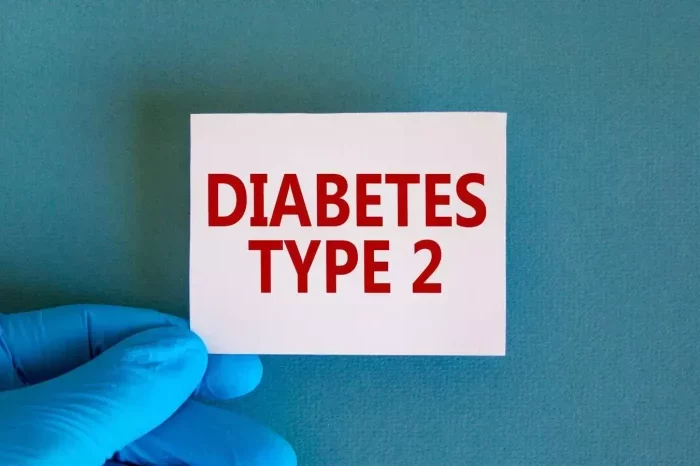Type 2 diabetes is a multifactorial metabolic disorder characterized by elevated blood sugar levels, insulin resistance, and impaired insulin secretion. It is a significant public health concern worldwide, affecting millions of individuals and imposing a substantial burden on healthcare systems.
While genetics plays a role in predisposing certain individuals to the disease, environmental and lifestyle factors also significantly contribute to its development.
In this comprehensive article, we will delve deeper into the various risk factors associated with type 2 diabetes and explore strategies for prevention and management.
Genetic Predisposition:
Family history is a strong predictor of type 2 diabetes risk. Individuals with a first-degree relative, such as a parent or sibling, with the condition are more likely to develop diabetes themselves.
Genetic studies have identified numerous susceptibility genes associated with type 2 diabetes, including those involved in insulin secretion, insulin action, and pancreatic function.
However, genetic predisposition alone is not sufficient to cause diabetes, and environmental factors play a crucial role in disease manifestation.
Obesity and Sedentary Lifestyle:
Obesity is a well-established risk factor for type 2 diabetes. Excess adipose tissue, particularly visceral fat located around the abdomen, secretes inflammatory cytokines and adipokines that disrupt insulin signaling and promote insulin resistance.
Sedentary behavior exacerbates this effect by further reducing insulin sensitivity and impairing glucose uptake by muscles. Individuals who lead a sedentary lifestyle and engage in minimal physical activity are at a higher risk of developing type 2 diabetes, especially when combined with poor dietary choices.
Unhealthy Diet:
Dietary habits play a central role in the development of type 2 diabetes. Consuming a diet high in refined carbohydrates, sugars, and saturated fats contributes to weight gain, insulin resistance, and metabolic dysfunction.
Processed foods, sugary beverages, and snacks laden with added sugars can lead to rapid spikes in blood sugar levels and insulin secretion, placing undue stress on pancreatic beta cells.
Conversely, a balanced diet rich in whole grains, fruits, vegetables, lean proteins, and healthy fats can help regulate blood sugar levels and reduce the risk of diabetes.
Age and Ethnicity:
Age is a significant risk factor for type 2 diabetes, with the prevalence of the disease increasing with advancing age.
Individuals aged 45 and older are at a higher risk due to age-related changes in metabolism, decreased physical activity, and increased prevalence of comorbidities such as obesity and hypertension.
Additionally, certain ethnic and racial groups are disproportionately affected by type 2 diabetes, including African Americans, Hispanic/Latino Americans, Native Americans, Asian Americans, and Pacific Islanders. These disparities are attributed to a combination of genetic predisposition, cultural dietary patterns, socioeconomic factors, and access to healthcare.
Gestational Diabetes:
Gestational diabetes mellitus (GDM) is a temporary form of diabetes that occurs during pregnancy. Women who develop GDM are at an increased risk of developing type 2 diabetes later in life, as are their offspring.
Pregnancy-related hormonal changes, insulin resistance, and metabolic adaptations can lead to elevated blood sugar levels during gestation. While GDM typically resolves after childbirth, women with a history of GDM should undergo regular screening for type 2 diabetes and adopt healthy lifestyle habits to reduce their long-term risk.
Other Risk Factors:
In addition to the factors mentioned above, several other risk factors can increase an individual’s susceptibility to type 2 diabetes. These include:
1. Polycystic ovary syndrome (PCOS):
Women with PCOS have a higher risk of insulin resistance and type 2 diabetes due to hormonal imbalances and metabolic disturbances.
2. Hypertension (high blood pressure):
Elevated blood pressure is often associated with insulin resistance and contributes to cardiovascular complications in individuals with diabetes.
3. Dyslipidemia (abnormal lipid levels):
High levels of LDL cholesterol and triglycerides and low levels of HDL cholesterol are common in individuals with type 2 diabetes and increase the risk of cardiovascular disease.
4. Sleep disturbances:
Sleep apnea, insomnia, and other sleep disorders are associated with an increased risk of obesity, insulin resistance, and type 2 diabetes.
5. Smoking:
Cigarette smoking is a significant risk factor for type 2 diabetes and exacerbates the complications associated with the disease.
6. Stress and mental health disorders:
Chronic stress, depression, and anxiety can adversely affect glucose metabolism, insulin sensitivity, and overall health, increasing the risk of developing type 2 diabetes.
Conclusion:
Type 2 diabetes is a complex and multifaceted disease influenced by a combination of genetic, environmental, and lifestyle factors.
While some individuals may be genetically predisposed to the condition, modifiable risk factors such as obesity, sedentary behavior, unhealthy diet, age, ethnicity, and gestational diabetes play a significant role in its development.
Identifying individuals at high risk for type 2 diabetes and implementing targeted preventive strategies, including lifestyle modifications, dietary interventions, and pharmacological therapies when necessary, are essential for reducing the burden of this disease on individuals and society.
By promoting healthy behaviors, raising awareness, and addressing underlying risk factors, we can work towards preventing or delaying the onset of type 2 diabetes and improving overall health outcomes for all.



























